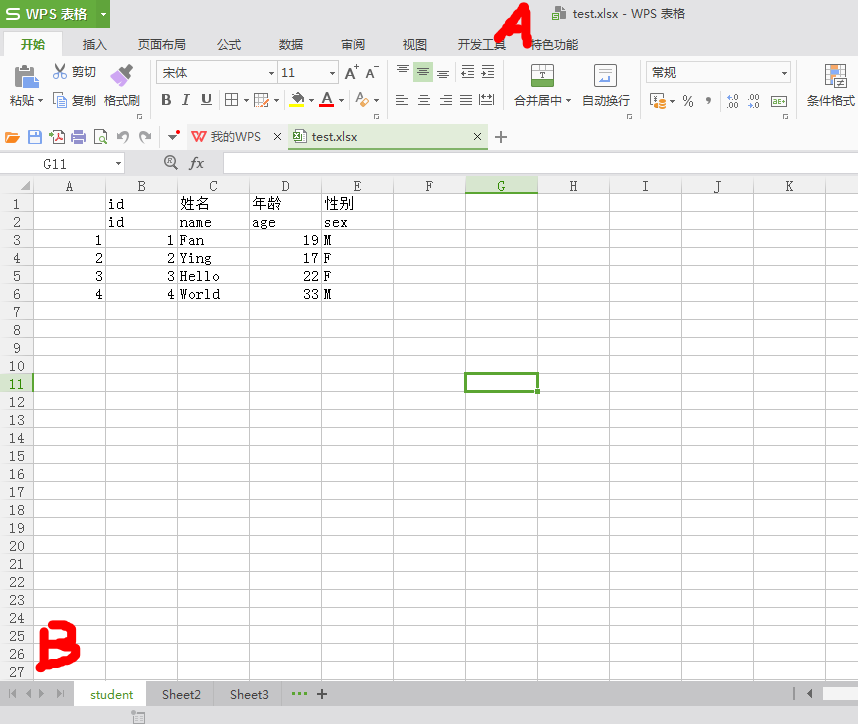python转换excel成py文件
文件结构如下:
originExcelFolder放用来转换的excel文件。
targetPyFolder用来存放最后生产的py文件。
setting.py用来配置excel表到py的对应关系。
excel2py.py是主要的处理文件。

Excel文件,A注意表名字,B注意sheet名字。

代码如下:
setting.py
#!/usr/bin/env python
#-*- coding: utf-8 -*-
# setting.py # 定义生成py表的格式
Dict ={
"student":{
"id": {'type':int, 'default': 0},
"name":{'type':str, 'default': None},
"age":{'type':int, 'default': 0},
"sex":{'type':str, 'default': 'F'},
}
}
excel2.py
#!/usr/bin/env python
#-*- coding: utf-8 -*-
# transfer excel to py
# 处理excel表格生成对应的py文件
from openpyxl import Workbook
from openpyxl import load_workbook
import sys
import os
import time
from setting import Dict as tranDict
TARGET_PY_PATH = "targetPyFolder/"
ORIGIN_EXCEL_PATH = "./originExcelFolder/"
LOG_LEVEL_INFO = "INFO"
LOG_LEVEL_DEBUG = "DEBUG"
LOG_LEVEL_ERR = "ERROR"
class Excel2py:
def __init__(self):
self.init()
def init(self):
self.tempSheetName = None
self.tempFileName = None
self.target_dict = {}
def handleFiles(self):
# 切换到handleExcel所在的那个路径
os.chdir(sys.path[0])
# 加载已经存在的excel,(这时候excel与.py文件在同一级目录下)
self.tempFileName = ORIGIN_EXCEL_PATH + "test.xlsx"
wb = load_workbook(self.tempFileName)
# 所有的页的名字
sheetNames = wb.sheetnames
# 这里只取出了第一个页来处理,
self.tempSheetName = str(sheetNames[0])
ws = wb[self.tempSheetName]
# 表的关键字
key_dict = {}
# 目标字典
self.target_dict = {}
# 取出关键字
for column_index in range(2,ws.max_column+1):
val = ws.cell(row=2, column=column_index).value
val = str(val)
if val:
key_dict[column_index] = val
# 遍历表的每行
for row_index in range(3, ws.max_row+1):
temp_dict = {}
for index in key_dict:
val = ws.cell(row=row_index,column=index).value
# 类型处理
val = self.handleType(self.tempSheetName,key_dict[index],val)
item_id = int(ws.cell(row=row_index,column=1).value)
temp_dict[key_dict[index]] = val
self.target_dict[item_id] = temp_dict
self.writeToPy()
def handleType(self,sheetName,stype,value):
"""
数据类型处理
"""
typeDict = tranDict[sheetName].get(stype)
rtnValue = typeDict['default']
if value is None or value == "None":
rtnValue = typeDict['default']
elif not isinstance(value, typeDict['type']):
rtnValue = (typeDict['type'])(value)
# 异常处理--Todo
# 写处理日志-Todo
else:
rtnValue = value
return rtnValue
def writeToPy(self,):
"""
写成py文件
"""
fileName = TARGET_PY_PATH + self.tempSheetName + ".py"
if os.path.exists(fileName):
os.remove(fileName)
pyFile = open(fileName,'a')
ids = self.target_dict.keys()
ids.sort()
pyFile.write("
Dict = {
")
for id in ids:
pyFile.write(str(id)+":"+str(self.target_dict[id]))
pyFile.write(",
")
pyFile.write("
}
")
#pyFile.flush()
pyFile.close()
logInfo = '=========transfer sheet:' + self.tempSheetName + " success"
print '=========logInfo:', logInfo
self.tranlog(self.tempFileName, self.tempSheetName,LOG_LEVEL_INFO, logInfo)
def tranlog(self, excelName, sheetName, logLevel, logInfo):
"""
写转换日志
"""
logFile = "log.log"
pyFile = open(logFile,'a')
logMsg = '
'+logLevel+"__"+str(time.time())+"__"+excelName.split('/')[-1]+"_"+sheetName+": "+logInfo
pyFile.write(logMsg)
# pyFile.flush()
pyFile.close()
if __name__ == "__main__":
Excel2pyObj = Excel2py()
Excel2pyObj.handleFiles()
注意:这里只处理了一个表的一个sheet,如果想要处理多个表多个sheet可稍作修改即可。
